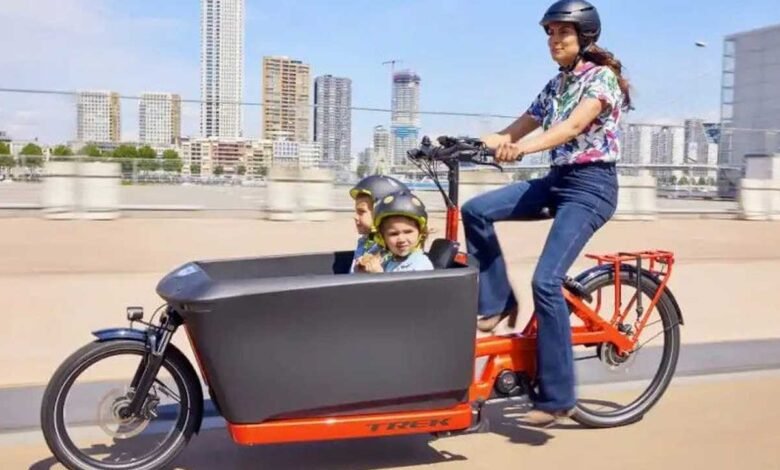Electric Cargo Bikes: The Rise of Transportation

Introduction
In recent years, a remarkable shift has been observed in urban transportation trends, with electric cargo bikes emerging as a game-changer in how goods are moved within cities. These innovative vehicles, often called, have gained significant traction due to their eco-friendly nature, efficient maneuverability, and potential to alleviate traffic congestion and air pollution. This article delves into the growing prominence and its transformative impact on urban mobility.

Electric Cargo Bikes Friendly Solution
Electric cargo bikes are a sustainable alternative to conventional delivery methods, such as vans and trucks powered by fossil fuels. With zero tailpipe emissions and reduced energy consumption, these bikes contribute to cleaner air and a greener environment. This eco-friendly attribute has resonated well with environmentally conscious consumers and urban planners aiming to create healthier, more sustainable cities.
Efficient Last-Mile Delivery
The “last mile” in delivery logistics has long been a challenge, often resulting in traffic congestion and inefficient use of resources. Electric provide a practical solution by efficiently navigating through congested urban areas and reaching destinations inaccessible to larger vehicles. Their compact size lets them weave through traffic and park conveniently, minimizing delivery times and enhancing overall efficiency.

Reduced Congestion and Noise Pollution
Traffic congestion is pervasive in urban centers, leading to increased travel times and frustration among commuters and businesses. They have the potential to mitigate this problem by taking up less road space and generating minimal noise compared to traditional motorized vehicles. As a result, they contribute to smoother traffic flow and create quieter neighborhoods, positively impacting the quality of urban life.
Cost-Effective Transportation
Electric weight bikes are an economically feasible option for original deliveries for businesses. The functional costs of these bikes are significantly lower than those of conventional vehicles, with reduced energy charges and conservation conditions. This cost-effectiveness makes them seductive for small businesses, food delivery services, and e-commerce companies looking to streamline operations while minimizing expenses.

Promotion of Health and Active Lifestyles
Beyond their commercial utility, I also encourage healthier and more active lifestyles. Cyclists benefit from physical exercise while riding these bikes, and their presence on the roads promotes cycling culture and raises awareness about sustainable transportation options. Moreover, cities prioritizing cycling infrastructure to accommodate cargo bikes often see increased overall bicycle use, contributing to improved public health and reduced reliance on motor vehicles.
Challenges and Future Prospects
Despite their numerous advantages, electric cargo bikes face challenges such as limited cargo capacity and potential regulatory issues in some areas. However, ongoing battery technology and design advancements address these concerns, resulting in increased range and load-bearing capabilities. Additionally, as more cities recognize the benefits of bikes, regulatory frameworks will likely evolve to support their safe integration into existing transportation systems.

Conclusion
The rise of electric cargo bikes marks a pivotal moment in urban transportation history. These vehicles combine sustainable technology with practical solutions to address pressing challenges such as air pollution, traffic congestion, and inefficient last-mile delivery. As urban areas continue to grow and evolve, they offer a promising way to reshape the urban mobility landscape, promoting cleaner.
FAQs of Electric Cargo Bikes: The Rise of Transportation
How do electric cargo bikes work?
They combine pedal power with an electric motor, assisting the rider's efforts. A rechargeable battery typically powers the engine and can be controlled through various modes.
What is the advantage of using electric cargo bikes for deliveries?
Electric cargo bikes offer eco-friendly, cost-effective, and efficient last-mile delivery solutions while reducing congestion and promoting a healthier urban environment.
What types of cargo can electric cargo bikes carry?
These bikes can carry a variety of cargo, such as parcels, groceries, food deliveries, packages, and even more oversized items, depending on the bike's design.
Electric Cargo Bikes: The Rise of TransportationHow Don You Like Our Post
0






